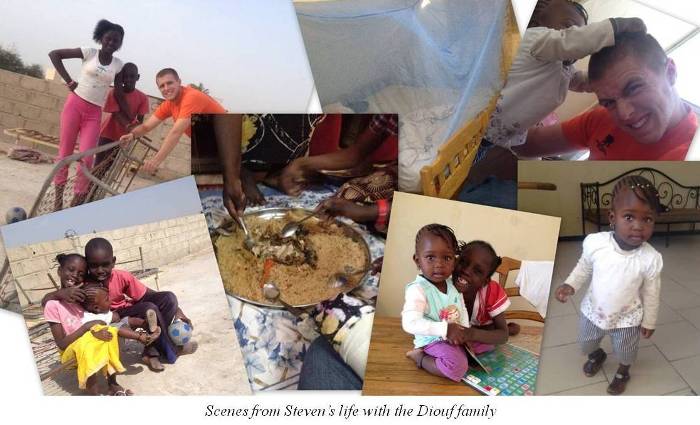News from Maison de la Gare
A Remarkable Christmas and New Year’s
Tweeter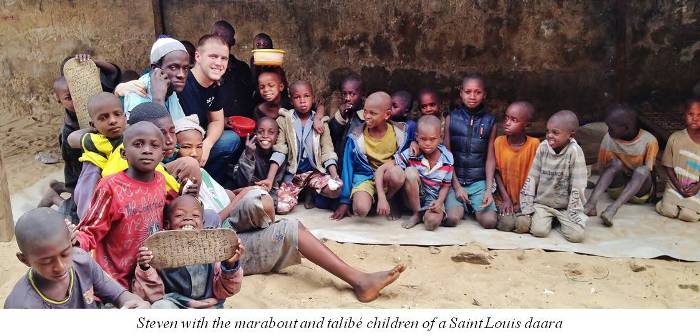
Steven Brandt’s unusual winter “vacation” with Maison de la Gare
This past winter break, I
embarked on a journey from Colorado Springs, Colorado to Saint Louis, Senegal
in order to serve the talibé children and work with Maison de la Gare. What
an experience! The trip began with my flight to Dakar followed by a four
hour car ride to northern Senegal and Saint Louis. My first experience in
Dakar was right outside the airport as I failed to stay inside wait for my
ride. Instead, I walked outside only to be convinced by a friendly Senegalese
man that he could help me find my ride. I took his help, not realizing that
afterword he would insist that I pay him for his “kind services.” Lost $20
within 30 minutes of being in the country, but it was a lesson well-learned.
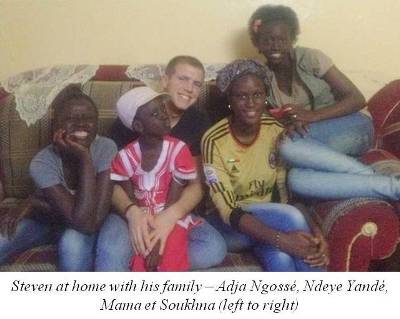
The drive to Saint Louis was amazing – from the agricultural lands
surrounding Dakar and Thiès and into the brush, semi-arid landscape of
northern Senegal. I arrived at my host family’s home around noon, and
lived with them throughout my stay. With four daughters and a son, the
Diouf family provided an amazing experience learning about Senegalese
culture and about the daily life of a Senegalese family. My first meal
was incredible – four eggs, onions, fries, and a baguette. The mother
of the house, Madame Diouf, treated me amazingly! She always made sure
that I knew when meals would be served, and insisted that I stay in contact
with her … not to mention the wonderful meals that we ate together on a rug
on the floor in a comfortable circle around one big plate in a very
friendly, communal manner that was much different from my meal times in
the United States.
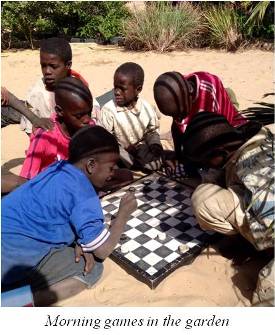
The first few days I was there I hung out with the youngest children the
most, Mohamed, Sokhna et Adja Ngossé. We would play soccer on the roof of
their house, take walks around their neighborhood together, and go to
buy treats at the local boutiques. Then, a few days into my time there,
“les vacances” began for all the kids and I met their older two daughters
Ndeye Yandé and Mama. It was great speaking French with them as they
explained to me how daily prayers work in the Muslim city, how their
schools operate, and what they like to do in their free time. This was
a very important and meaningful part of my trip to Saint Louis – living
with the Dioufs and experiencing on a daily basis their amazing
hospitality and care for me. Senegal is known as the land “Téranga”,
of hospitality, and it certainly showed in the time I spent with the
Dioufs.
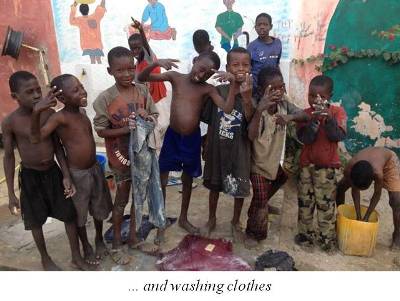
A typical day, including Christmas, began with me waking up around
9 a.m., working at Maison de la Gare’s center from 10 a.m. to 1 p.m.,
hanging out at home from 1:30 p.m. to 4:30 p.m., and then working at
the center again. After work, I spent the evenings either touring
Saint Louis, hanging out at the Diouf’s house, or socializing with
Issa, Bathe and Abdoul at their place until midnight. Issa, Bathe
and Abdoul were the primary workers at the center while I was there,
and they treated me with nearly as much hospitality as the Dioufs did.
On my first day at the center I met the staff, and then helped the
nurse Binta change the bandage on the badly burned foot of a young
talibé boy. Nearly half of his foot, I found out from Issa later,
had been burned off by other young talibés. He had been sleeping
on the streets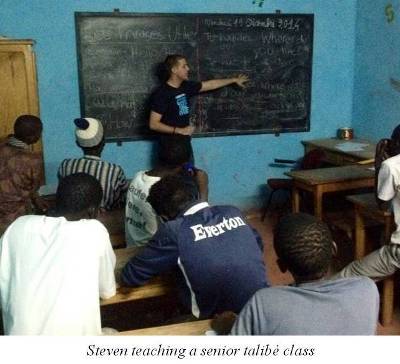 when the other children lit his foot on fire as a
prank to wake him up. I realized during my time in Saint Louis
that this kind of event is common in the lives of these young talibés.
They come from rural parts of Senegal or are trafficked from other
countries – I met kids from Gambia, Guinea, Guinea-Bissau, and Mali
– and are forced to work and beg for their marabouts who provide
them little means of survival and extort money from them.
when the other children lit his foot on fire as a
prank to wake him up. I realized during my time in Saint Louis
that this kind of event is common in the lives of these young talibés.
They come from rural parts of Senegal or are trafficked from other
countries – I met kids from Gambia, Guinea, Guinea-Bissau, and Mali
– and are forced to work and beg for their marabouts who provide
them little means of survival and extort money from them.
Although the children are often physically abused by the marabouts,
I was shocked at the toll the poor living conditions and the absence
of a family have on the kids. Another young boy I met, whom Issa had
taken in, had been found on the beach terribly stricken by scabies
to the point of not being able to use his hands. Bathe told me that
this was very common in daaras (the Koranic schools where the talibés
“live”) due to the terrible living conditions there. This helped give
me the right perspective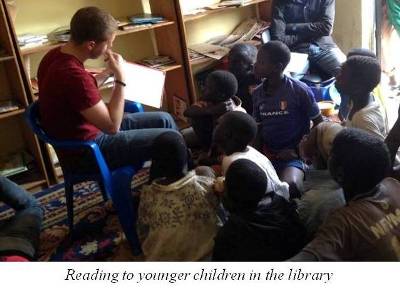 as I worked at the center, which was a huge
highlight of my time in Senegal.
as I worked at the center, which was a huge
highlight of my time in Senegal.
Each day except weekends and Christmas I would work in the mornings
in the garden or in the nurse’s office or help the talibé children
wash their clothes. Sometimes, I would play games or just chat with
the older talibés as well. There were a good number of older talibés
who had been living in daaras for a long time. One such youth was
Kalidou. He spoke French, Wolof, Peul and some English and lived in a
daara right near the Dioufs.
I would often walk home with him, talking
to him about football, our families, or one of the hundreds of other
questions I had 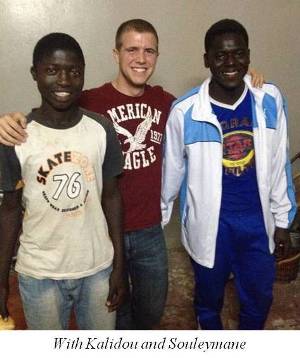 about Senegalese culture such as: why do Senegalese
people often chew lemon branches? Or, how does the taxi system work?
about Senegalese culture such as: why do Senegalese
people often chew lemon branches? Or, how does the taxi system work?
In the evenings working at the center, I quickly became the resident
French/English teacher to the older talibés, mostly ages 15-21. Every
evening we would conjugate verbs or learn useful phrases in French and
English, repeating them over and over again and copying them down until
they could functionally use them. It was an amazing time, and I was
truly humbled to teach these guys who were nearly my own age something
that might one day at least help them if not motivate them to pursue a
more meaningful life. They were so grateful, but I was really the one
grateful to them.
As I wrapped up my time in Saint Louis, I could not help but remember
all the great times I had had with Bathe, Abdoul and Issa when I was
not at the center. They invited me to play soccer with them, had me
over for dinner and tea, and helped me get gifts for my family back home.
One of the biggest takeaways I had from the trip was just humility about
our way of life in the United States. It is often too busy and too
focused on us. I served and relaxed in Senegal, building relationships
that will hopefully last me a lifetime and, maybe in some small way,
changed people’s lives. That’s what life is really all about, and I
would not have traded in my winter break … Christmas, New Year’s and
all … for anything other than the experience I had in Saint Louis with
the amazing people I met there!
